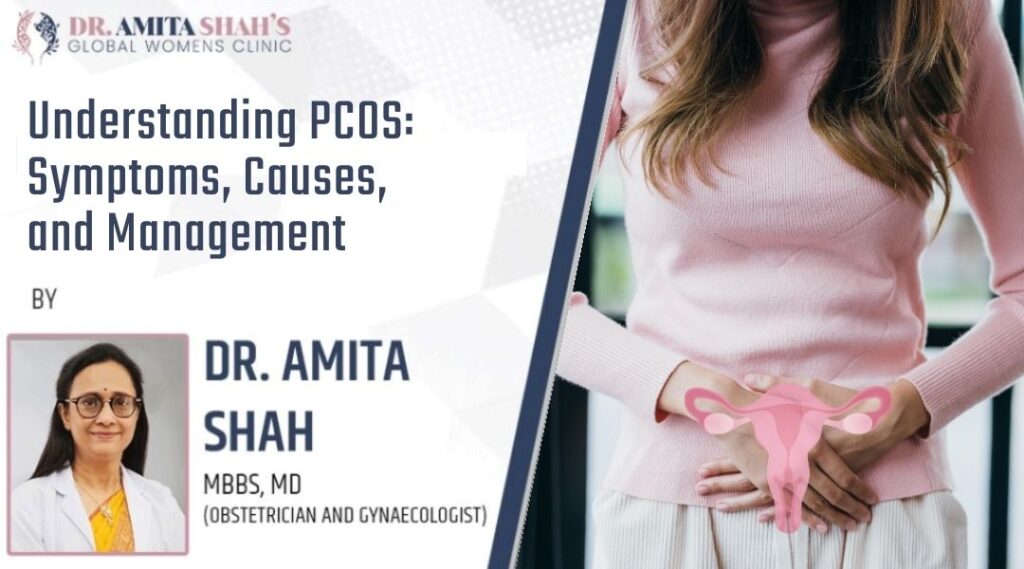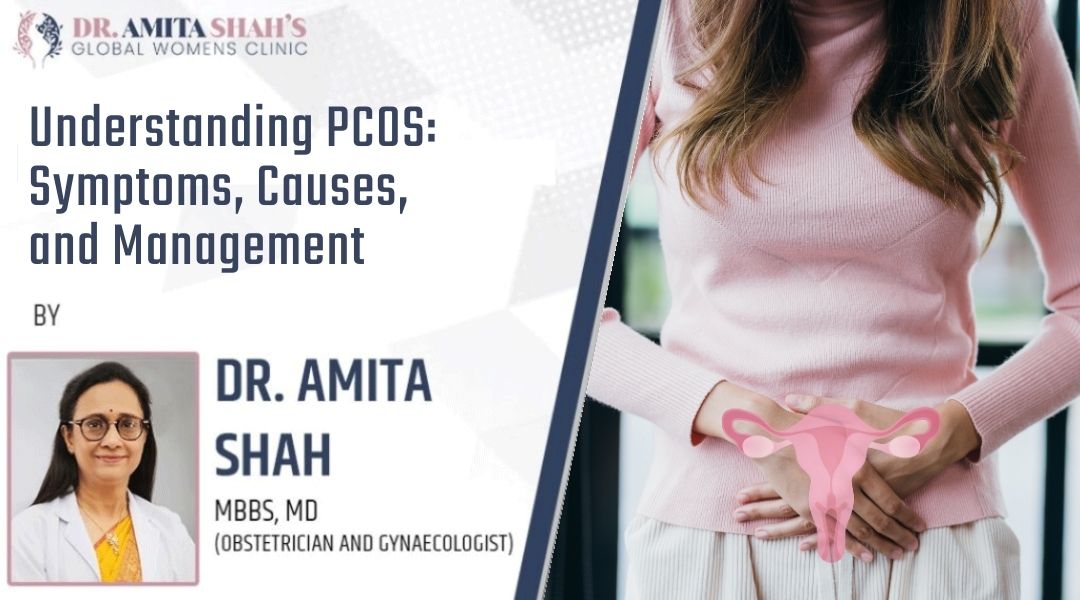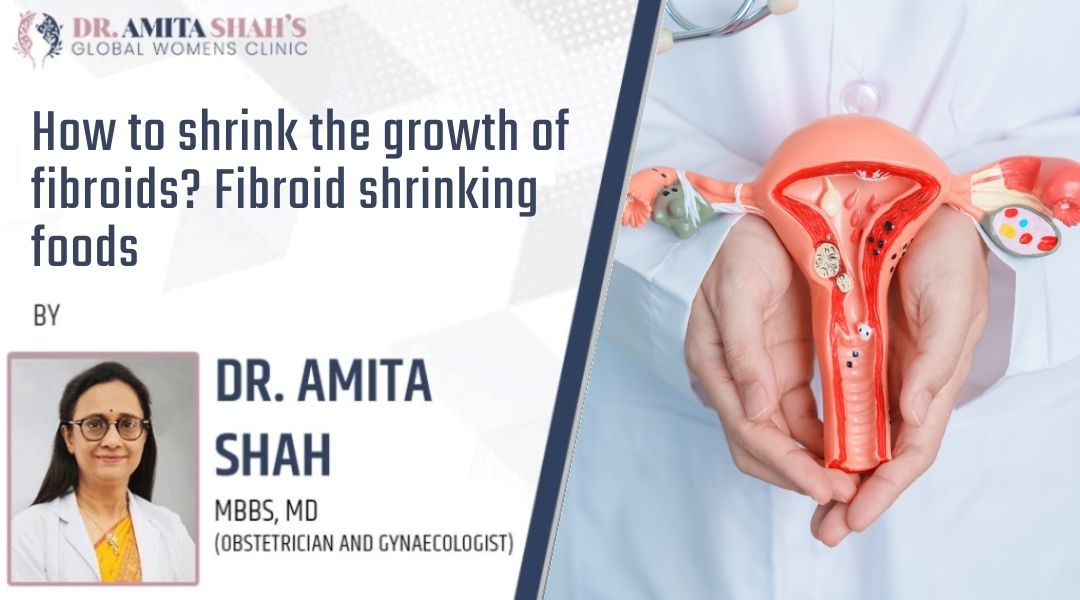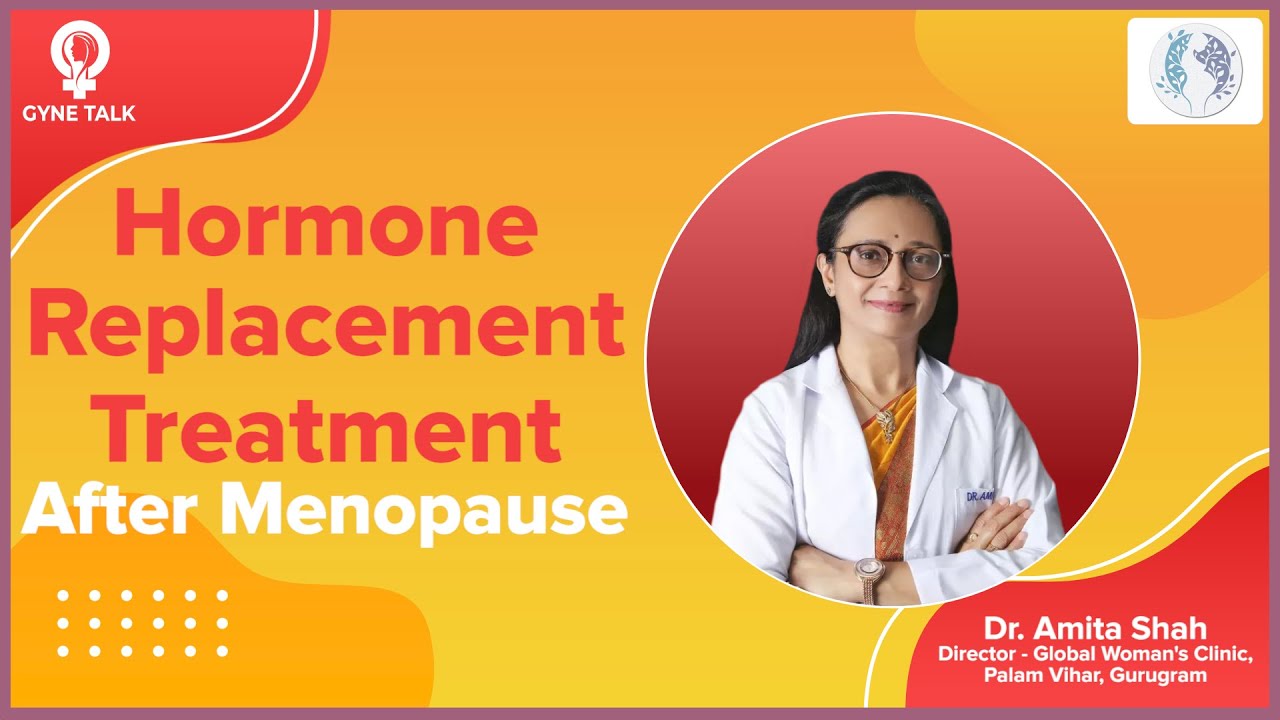Introduction to PCOS
Polycystic Ovary Syndrome (PCOS) has become such a common term these days that I believe every girl is aware of it. Either she is experiencing it herself, or someone in her family like a friend, sister, or relative is dealing with it. Many also refer to it as the PCOD problem or wonder what is PCOS and whether polycystic ovary PCOS is the same condition.
What is PCOS?
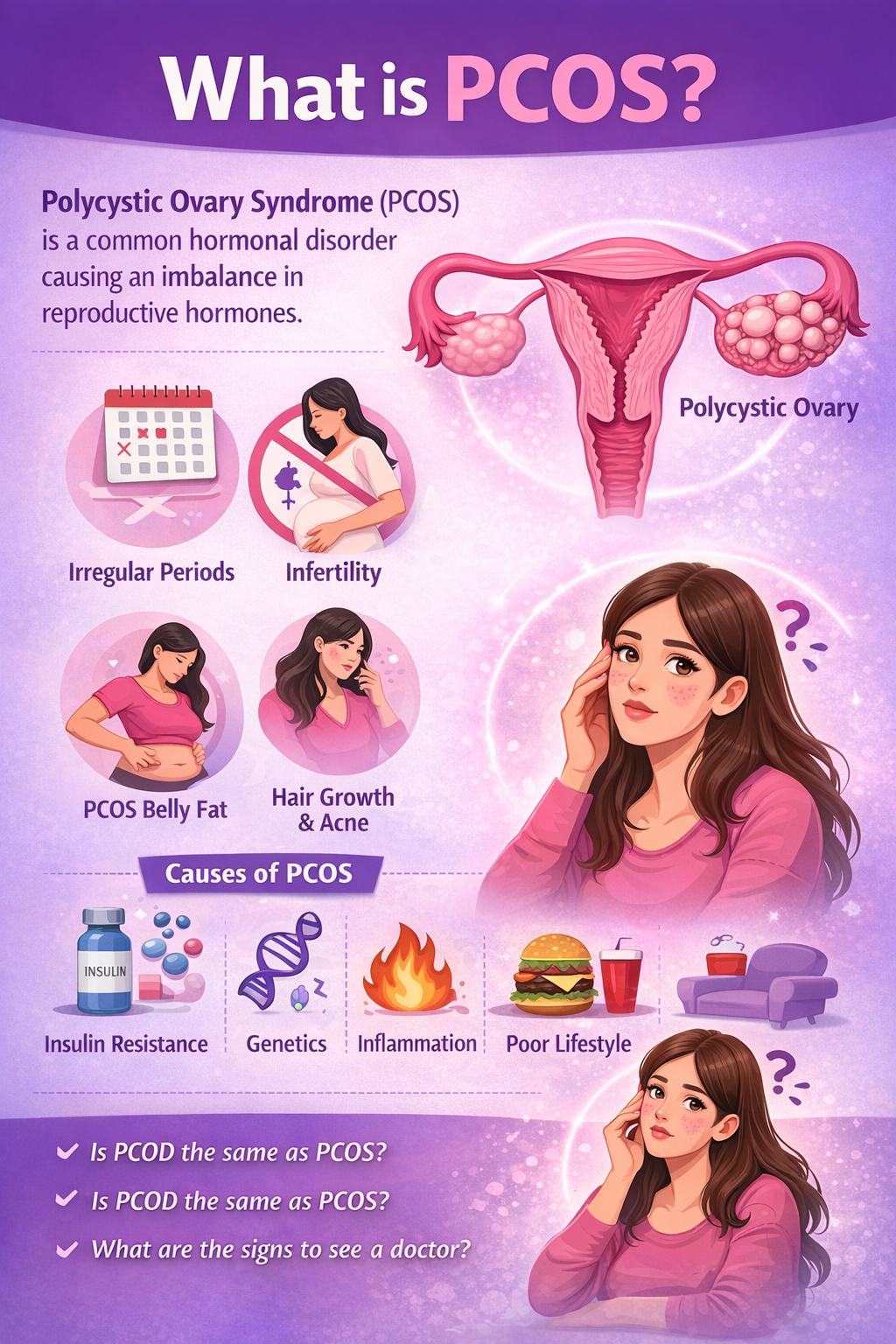
Polycystic Ovary Syndrome (PCOS) is a prevalent hormonal disorder, also known as an endocrine disorder, that affects individuals with ovaries. In essence, polycystic ovary PCOS means an imbalance in reproductive hormones, which can disrupt menstrual cycles and lead to various health issues.
Often referred to as a lifestyle disorder, PCOS can result in irregular cycles, infertility, difficulty conceiving, obesity, and stubborn PCOS belly fat. The exact PCOS causes are still being studied, but it is often linked to insulin resistance, genetics, inflammation, and poor lifestyle habits.
Early and accurate PCOS diagnosis and proactive treatment for PCOS problem are essential for maintaining overall well-being and reproductive health.
So, what exactly is PCOS? What is the PCOD problem? Is PCOD the same as PCOS? What are the symptoms to PCOS that should prompt you to see a doctor? How do doctors confirm PCOS diagnosis through hormonal tests and ultrasound? In this discussion, we will explore these questions in detail.
Polycystic Ovary Syndrome Symptoms
Why Does PCOS Occur?
PCOS commonly occurs in women who have a family history of it. If your mother, sister, or aunt has experienced it, your chances of developing it increase. Genetics, insulin resistance, and lifestyle factors are considered important PCOS causes.
A poor diet, lack of physical activity, and absence of regular PCOS exercise or PCOS yoga routines can further worsen hormonal imbalance.
Symptoms of PCOS
The primary factor contributing to polycystic ovary PCOS is frequently associated with insulin resistance. Insulin is a hormone in your body, and when you develop resistance to it, your body experiences elevated insulin levels (hyperinsulinemia).
This connection plays a significant role in hormonal imbalance. Due to this, male hormones (like testosterone) increase, leading to multiple symptoms to PCOS such as acne, PCOS hair growth, and irregular periods.
Common Polycystic Ovary Syndrome Symptoms
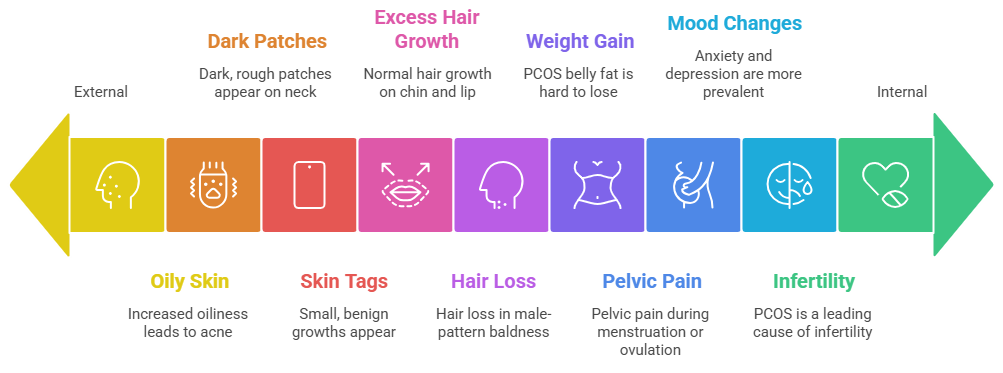
These symptoms include:
- Oily Skin – Increased oiliness can lead to acne breakouts, affecting overall skin health.
- Excess Hair Growth – Normal hair growth may occur on the chin and upper lip, as well as in areas like the chest and around the nipples.
- Hair Loss – Some girls may experience hair loss, particularly in a pattern often referred to as male-pattern baldness.
- Dark Patches – Dark, rough patches may appear on the neck, armpits, and inner thighs, known as acanthosis nigricans.
- Irregular Periods – Many individuals with PCOS experience irregular menstrual cycles, which can be delayed or missed altogether.
- Infertility –PCOS is a leading cause of infertility, closely linking polycystic ovary syndrome and fertility.
- Weight Gain –Many women struggle with PCOS belly fat, which can be hard to lose.
- Pelvic Pain – Some individuals may experience pelvic pain, especially during menstruation or ovulation.
- Mood Changes – Emotional symptoms, including anxiety and depression, can be more prevalent among those with PCOS.
- Skin Tags – Small, benign growths, known as skin tags, may appear, often in areas where skin rubs against skin.
As testosterone levels increase, egg production in the ovaries is impacted. Normally, an egg matures and is released every cycle around days 15-16, which is known as ovulation. However, elevated testosterone levels can impair this ovulation process, leading to delayed periods.
Irregular Cycles
Periods that should normally occur every 28-30 days may be delayed. Some girls may experience long gaps of up to three months or more. This is a common issue referred to as irregular cycles or delayed periods, one of the hallmark PCOS symptoms and treatment areas for doctors.
Infertility Issues
If ovulation does not occur, egg production is affected, leading to infertility. Polycystic ovary syndrome and fertility are closely linked, as PCOS is a major cause of infertility. Timely PCOS treatment can help regulate ovulation and improve conception chances.
Long-term Complications of PCOS
High insulin levels can increase body weight and contribute to obesity, hypertension, diabetes, and altered lipid profiles. These conditions together form metabolic syndrome.
To prevent complications, lifestyle modification is essential. A balanced PCOS diet chart, regular PCOS exercise, and consistent PCOS yoga practices can significantly improve insulin sensitivity and help manage symptoms..
- Diabetes
- Hypertension
- Altered lipid profiles
- Obesity
These factors combine to create a syndrome known as metabolic syndrome, increasing the risk of heart disease or stroke later in life.
Emotional and Psychological Effects
Hormonal imbalance and weight gain, including stubborn PCOS belly fat, can affect confidence and mental health. Early intervention and structured treatment for PCOS problem can improve both physical and emotional well-being.
Timely Diagnosis of PCOS
If you experience symptoms to PCOS such as irregular periods, excess PCOS hair growth, acne, or difficulty conceiving, it is important to seek proper PCOS diagnosis.
Doctors may recommend hormonal tests and ultrasound to confirm polycystic ovary PCOS. Early treatment to treat PCOS symptoms may include lifestyle modification, medication, and a personalized PCOS diet chart along with guided PCOS yoga and exercise plans.
Is PCOD the Same as PCOS?
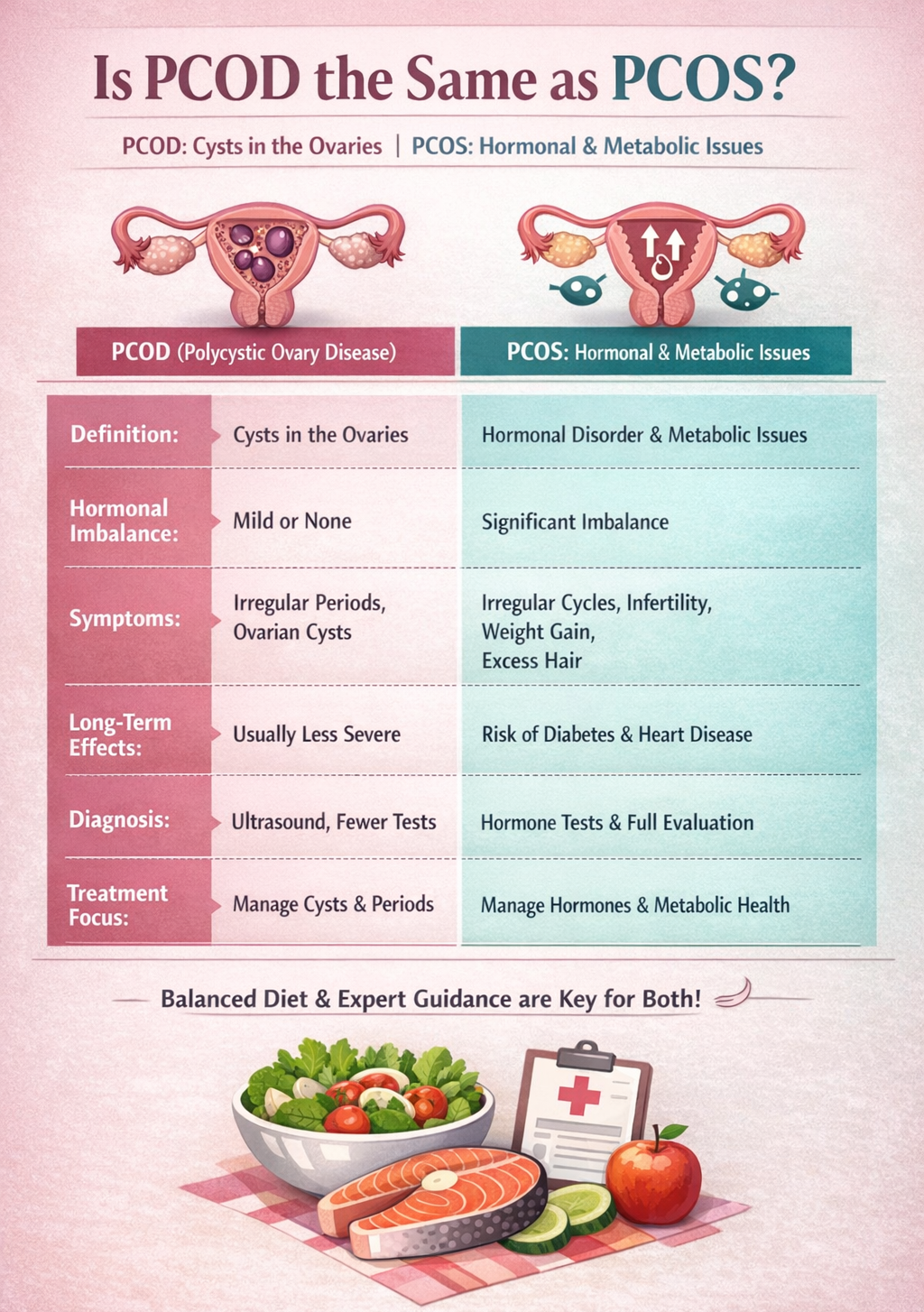
Polycystic Ovary Disease (PCOD) and Polycystic Ovary Syndrome (PCOS) are often confused but differ slightly. PCOD refers mainly to cyst formation in the ovaries, while PCOS involves hormonal imbalance and metabolic disturbances.
A well-balanced PCOD diet chart and medical guidance from PCOS specialists can help manage both effectively.
| Feature | PCOD (Polycystic Ovary Disease) | PCOS (Polycystic Ovary Syndrome) |
| Definition | Refers primarily to the presence of cysts in the ovaries. | A hormonal disorder with a broader range of symptoms and metabolic issues. |
| Hormonal Imbalance | Typically less severe hormonal imbalance may not be present. | Involves significant hormonal imbalances, including elevated androgen levels. |
| Symptoms | May include irregular periods and ovarian cysts, but often milder. | Symptoms include irregular menstrual cycles, infertility, obesity, and excess hair growth. |
| Long-Term Effects | Generally less severe; may not lead to major health issues. | Can lead to serious long-term health problems, including diabetes and heart disease. |
| Diagnosis | Diagnosed based on the presence of cysts, often with fewer hormonal tests. | Diagnosed through a combination of symptoms, hormonal tests, and imaging. |
| Treatment Focus | May focus on managing cysts and regularizing periods. | Emphasizes managing a range of symptoms and underlying metabolic issues. |
Conclusion
Polycystic Ovary Syndrome (PCOS) is a complex hormonal disorder that affects many individuals with ovaries, leading to a variety of symptoms and potential long-term health issues. Understanding its causes, symptoms, and the distinction between PCOS and PCOD is crucial for effective diagnosis and management. Early intervention and proactive treatment can significantly enhance overall well-being and reduce the risk of complications, highlighting the importance of awareness and education about PCOS for those impacted.
With the right PCOS diet plan, regular PCOS exercise, and professional PCOD problem treatment, one can manage symptoms effectively and improve overall well-being. Early intervention and proactive PCOS treatment can significantly enhance health outcomes and reduce complications.

